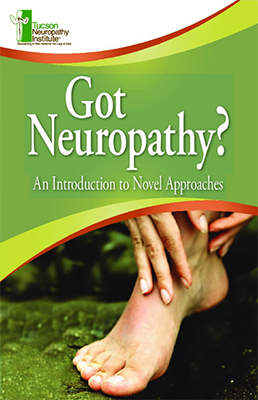Not Just Diabetes: Breaking Down the Causes of Neuropathy
Diabetes and neuropathy are strongly associated with one another—and for good reason. Diabetes is, by far, the No. 1 cause of neuropathy. And virtually everyone with diabetes will develop some degree of damage to their peripheral nerves after decades of dealing with the disease.
But diabetes is also far from the only cause of peripheral neuropathy. And as Southern Arizona’s leading experts on peripheral nerve health, we see people all the time with no diabetes diagnosis but significant problems with peripheral nerve function.
Here are some of the most common other causes and risk factors for peripheral neuropathy.
Dietary Deficiencies
Just like any other organ, tissue, or system in your body, your nerves need the right kinds and amount of nutrients in order to perform their best. Deprive them of those nutrients, and they begin to break down and misfire.
In particular, omega-3 fatty acids and B vitamins are especially critical for nerve health. This includes thiamine (B1), niacin (B3), B6, folate (B9) and B12. Other important nutrients used by the nervous system include calcium, magnesium, and Vitamin E.
Alcohol Abuse
Over-imbibing alcoholic drinks can adversely affect your nerve health, especially if you consistently struggle with alcoholism.
For starters, in indirect terms, people who are alcoholics are also much more likely to consume a poor diet. So you may not be getting enough of those essential nutrients to nourish your nerves in the first place.
But alcohol abuse can also cause more permanent and direct damage to your nerves, too. Alcohol metabolizes extremely quickly and can penetrate the neurons in minutes, blocking neurotransmitters from performing their normal functions. Over time, this can lead to permanent damage to the nerve tissues.
Furthermore, when you drink, your body needs to expend those same essential nutrients to purge alcohol from the body—B vitamins, for example, quickly deplete when you drink. That means there are fewer nutrients left over for your nerves.
Thyroid Problems
Your thyroid, located in your neck, is one of the most important glands in your entire endocrine system. The hormones that it releases into your body are critical for regulating your basal metabolic rate and your heart rate, among other things.
However, some people suffer from hypothyroidism, a condition in which the thyroid isn’t producing as many hormones as it should. And if your hypothyroidism is untreated and unregulated over a long period of time, peripheral neuropathy can develop.
We still aren’t 100% sure why this happens. However, we do know that hypothyroidism does result in excess fluid retention throughout the body, which leads to swelling. It’s theorized that this swelling tissue puts excess pressure on the peripheral nerves, damaging them.
Reactions to Medication
Certain medications can have toxic side effects for nerve health. The symptoms of neuropathy might be temporary and recede in the weeks and months following your treatment course, although permanent damage is possible.
Most notably, several chemotherapy drugs (used to fight cancer) and medications to manage HIV/AIDs are known to increase your risk of developing neuropathy. While this is an unfortunate association, it’s often a necessary sacrifice—though neuropathy poses serious health risks of its own, treating your cancer or HIV is higher priority.
Other medications that can sometimes lead to neuropathy include those used to fight severe infections (including tuberculosis), autoimmune diseases, seizures, gout, and alcohol use.
Environmental Toxins
In addition to medical side effects, neuropathy may be triggered by exposure or consumption of various toxic substances, particularly heavy metals and industrial chemicals. We already mentioned alcohol. Other examples include mercury, lead, arsenic, nitrous oxide, antifreeze, chemical herbicides (including Agent Orange), and many others.
Infections
Certain serious viral or bacterial infections are known to adversely affect peripheral nerve health. Viruses such as the chicken pox and shingles virus, West Nile virus, and herpes simplex often attack delicate sensory fibers, which can cause sharp and painful symptoms. Other infections associated with neuropathy include Lyme disease, Epstein-Barr, hepatitis B and C, diphtheria, and HIV/AIDS.
Kidney and/or Liver Disease
Kidneys and the liver are the organs most responsible for filtering your blood of both insoluble (liver) and soluble (kidney) molecular toxins and flushing excess waste products and fluids out of the body. Diseases that affect these vital organs can have significant and negative repercussions throughout your body, and neuropathy is among them.
There are several possible reasons for this. Poorly functioning liver and kidneys can result in deficiencies in essential nerve-nourishing nutrients. And of course, the presence of elevated levels of toxins in the bloodstream can damage all types of tissues.
Autoimmune Disorders
Autoimmune disorders are a broad category of conditions in which your body’s immune system malfunctions and begins attacking your own cells, organs, and tissues. Diseases that attack the peripheral nervous system include Sjogren’s syndrome, lupus, and rheumatoid arthritis.
Some autoimmune disorders primarily or even exclusively target motor nerve fibers, meaning symptoms are mainly muscle weakness and shrinking (as opposed to pain or numbness). These include Guillain-Barré and chronic inflammatory demyelinated polyneuropathy.
Direct Injury
Peripheral nerves are delicate structures, and accidental injuries and traumas can absolutely impair their function. Sports injuries, motor vehicle accidents, and even falls can sometimes sever nerves. Broken bones, too, can place extra pressure on the nerves and damage them.
Other direct traumas that might impair nerve function include wearing a cast or footwear that’s too tight, surgical mistakes, or even repetitive motions such as crouching or typing.
Idiopathic Neuropathy
Despite all these known causes of neuropathy, we can’t always explain why one person develops the condition. If a cause cannot be isolated, we call it “idiopathic” neuropathy.
This doesn’t mean your neuropathy “just happened”; it means only that we don’t know why. In fact, idiopathic simply means “unknown cause.” Research continues to help us more fully understand neuropathy and its complex causes.
Whatever Caused Your Neuropathy, We Can Help
Whether your neuropathy is linked with diabetes, dietary concerns, surgical errors, alcoholism, or any other reason—including unknown reasons—we can help you reduce your pain, heal your nerves to greatest extend possible, and improve your life.
Recent developments in medical technology have pushed neuropathy treatment forward by leaps and bounds. Thanks to advanced techniques such as radiofrequency nerve ablation, laser therapy, decompression surgery, and more, we’re able to do a lot more than just symptom management. Many of our patients have been able to restore feeling and function, and return to activities they previously enjoyed!
Of course, we will also help you better manage the underlying cause of your neuropathy, whatever it may be, so that you can continue to protect your nerve health in the future.
To schedule an appointment with the peripheral neuropathy experts at Tucson Foot & Ankle Institute, please give us a call today at (520) 545-0202, or simply fill out our request form online.
Don’t Wait to Ask for Help!
No matter how far along you are on the path of diabetic foot complications, we can help you. But in severe cases, the existing damage is not always completely reversible. And the longer you wait, the greater your risk of an injury, wound, or infection that leads to a catastrophic change in your quality of life. So don’t wait until it’s too late! The earlier you see us, the better we can help you. To schedule an appointment with Dr. Shih, please call (520) 545-5717 today.Free Books
Contact Us
Office Hours:
Monday - Friday
8:00AM - 5:00PM
Tucson Foot & Ankle Institute:
7406 N. La Cholla Blvd.
Tucson, AZ 85741
Phone: (520) 545-0202
Fax: (520) 545-0201
© Tucson Foot and Ankle Institute. All Rights Reserved. | Privacy Policy






